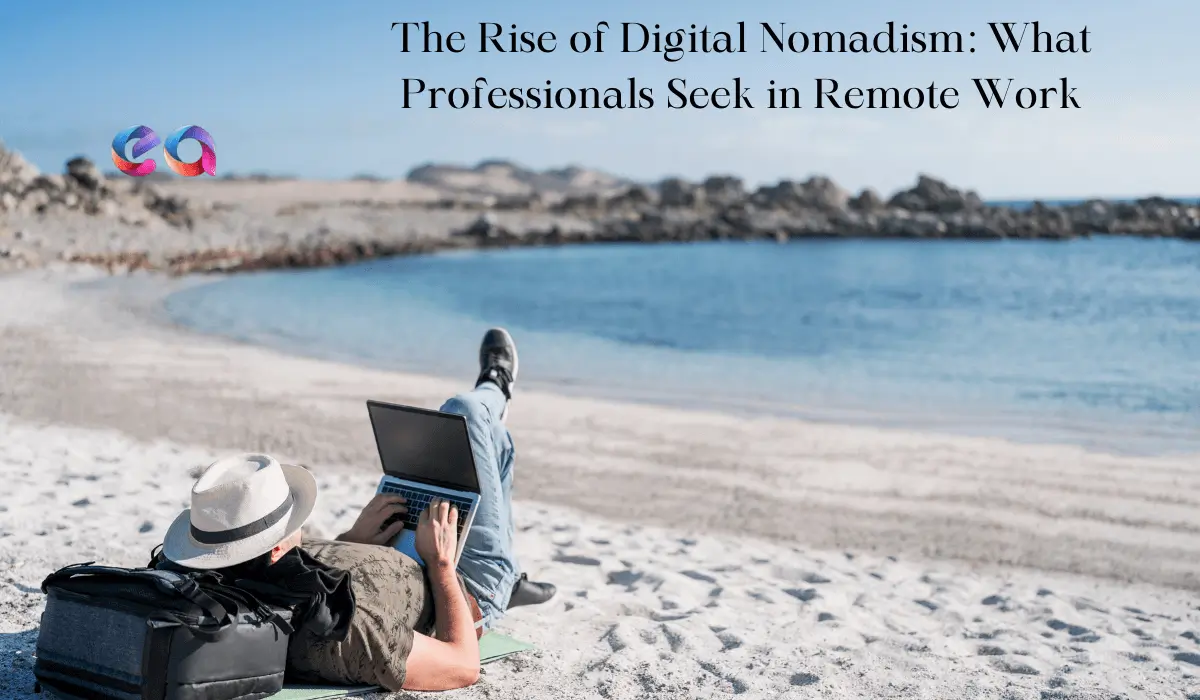
The rise of remote work and digital nomadism has fundamentally changed how people view employment. No longer tethered to a traditional 9-to-5 office job, today’s workforce seeks flexibility, fulfillment, and alignment of work and lifestyle. This shift is redefining what professionals desire in a career.
Table of Contents
Location Independence Enables New Lifestyles Remote work
A primary motivation for becoming a digital nomad is the ability to work from anywhere. With only a laptop and internet connection, remote employees can see the world while earning an income. This location independence grants the freedom to create a personalized lifestyle – balancing travel, leisure, and work. Many digital nomads curate unique lifestyles that would be impossible with a stationary job. Some choose to become long-term expatriates, basing themselves in tropical destinations like Bali or coastal European cities. Others adopt a roaming approach, visiting multiple countries per year. This flexibility enables diverse, customized experiences.
Prioritizing Purpose and Fulfillment
Today’s workforce increasingly prioritizes finding meaning and fulfillment in their careers. Professional accomplishments are no longer enough – employees want work to align with personal values. This motivates many to pursue remote work opportunities. Digital nomad jobs allow people to contribute their skills to causes they care about. Remote work provides the freedom to choose organizations with positive social or environmental impacts. Professionals can find purpose-driven roles that resonate with their passions.
Seeking Better Work-Life Integration
Work-life balance remains an elusive goal for many professionals. The always-connected digital age makes it difficult to disengage from work. Remote and freelance roles provide greater control over scheduling, enabling better work-life integration. Digital nomads structure their days to accommodate personal needs and preferences. They may start work early to free up afternoons for recreation and socializing. Others take extended midday breaks for exercise or family time. By not being bound to an office schedule, remote workers integrate work and life on their terms.
Wellness Software for the New Workforce
As the remote work revolution transforms the labor market, more companies are adopting corporate wellness software to support the health and well-being of their dispersed workforce. This software includes tools for mental health, physical health, and stress management. Digital nomads can access these resources from anywhere, enabling them to prioritize their well-being while working remotely.
Valuing Professional Flexibility and Autonomy
Digital nomads value professional flexibility and autonomy. They want to work on their own terms, without micromanagement or rigid schedules. Remote work enables professionals to structure their workday in a way that suits their productivity style. They can choose to work in a quiet environment or a bustling café. They can work during their most productive hours, whether that’s early morning or late at night. This flexibility empowers digital nomads to take ownership of their work and achieve their goals.
[content-egg-block template=offers_grid]
Blending Work, Travel, and Community
Many digital nomads seek to blend work, leisure, and social connections within their lifestyles. Remote work enables new ways of integrating these elements. Nomads tap into travel and social opportunities unavailable in a regular office job. They can work from a beachside café in Bali, attend a coworking event in Lisbon, or join a digital nomad community in Chiang Mai. This blending of work, travel, and community creates a unique lifestyle that is both fulfilling and productive.
Leveraging Technology to Enable the Nomadic Lifestyle
Technology is the backbone of the digital nomad lifestyle. It enables remote work, communication, and collaboration. Digital nomads rely on technology to stay connected with colleagues, clients, and friends. They use video conferencing, instant messaging, and project management tools to collaborate on projects. They use cloud storage and file-sharing services to access their work from anywhere. Technology enables digital nomads to work efficiently and effectively, no matter where they are in the world.
Achieving Work-Life Balance and Avoiding Burnout
Digital nomads face unique challenges when it comes to work-life balance.They must balance work,travel,and leisure time while maintaining their productivity.Burnout is a common risk for digital nomads,as they may struggle to disconnect from work.To avoid burnout,digital nomads must prioritize self-care and set boundaries around their work.They can take time off to recharge,explore alternative accommodations,and seek out social connections.By prioritizing their well-being,digital nomads can achieve work-life balance and avoid burnout.
Conclusion
Digital nomads are a growing segment of the workforce,and their needs and desires are shaping the future of employment.By prioritizing location independence,purpose,work-life integration,wellness,flexibility,and community,digital nomads are creating unique lifestyles that are both fulfilling and productive.As technology continues to enable remote work,we can expect to see more professionals embrace the digital nomad lifestyle.
FAQs
What is a digital nomad?
A digital nomad is a remote worker who uses technology to work from anywhere in the world.They are not tied to a physical office and can work from a café,coworking space,or beachside resort.
What are the benefits of being a digital nomad?
Digital nomads enjoy many benefits,including location independence,professional flexibility,and autonomy.They can structure their workday to accommodate personal needs and preferences,and they can work from anywhere in the world.Digital nomads also have the freedom to create a personalized lifestyle that balances work,travel,and leisure.
What are the challenges of being a digital nomad?
Digital nomads face unique challenges,including work-life balance,isolation,and burnout.They must be self-motivated and disciplined to maintain their productivity while working remotely.Digital nomads must also be comfortable with uncertainty,as they may face unexpected challenges while traveling or working in new environments.
How can I become a digital nomad?
To become a digital nomad,you need to have a skill set that is in demand in the remote work market.You should also have a reliable internet connection and a laptop or mobile device.Many digital nomads start by freelancing or working remotely for a company.You can also join digital nomad communities to learn from others and find job opportunities.












